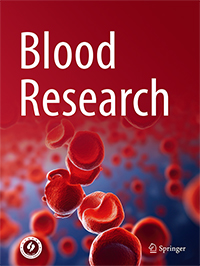Original Article
Korean J Hematol 2005; 40(2):
Published online June 30, 2005
https://doi.org/10.5045/kjh.2005.40.2.82
© The Korean Society of Hematology
한국인 만성골수성백혈병 환자의 Imatinib (STI-571) 내성 및 BCR-ABL 유전자 돌연변이 검출
손용학, 지현숙, 박찬정, 이규형, 서을주
울산대학교 의과대학 서울아산병원, 진단검사의학과, 내과
Clinical Resistance to the Tyrosine Kinase Inhibitor Imatinib (STI571) and Detection of BCR-ABL Gene Mutations in Korean Patients with Chronic Myeloid Leukemia
Background: Imatinib mesylate, the tyrosine kinase activity of the BCR-ABL fusion gene, induces a remarkable remission in chronic myeloid leukemia (CML) patients. However, resistance to imatinib has been observed in a significant proportion of subjects, with the point mutations of the BCR-ABL kinase domain clinically identified as a possible mechanism. The aim of this study was to investigate clinical resistance to imatinib in Korean CML patients, and search for the point mutation of the BCR-ABL gene.
Methods: The clinical data and cytogenetic results of thirty two CML patients, who were treated with imatinib, between Jan. 2002 and Aug. 2003, were evaluated. Mutational analyses for the point mutations of the BCR-ABL kinase domain in clinically resistant patients were tested using RT-PCR and direct sequencing methods.
Results: Complete hematological remission was obtained in all CML patients with a chronic phase and in 4 of 6 CML with accelerated or blast crisis. However, 4 patients (2 in the chronic phase and 2 with blast crisis) relapsed to blast crisis following continued treatment. A major cytogenetic response was observed in 67% of the chronic phase patients, but in 2, the Philadelphia chromosomes reemerged in a follow-up chromosome study. Mutational analyses showed point mutations in the 351st amino acid of the BCR-ABL kinase domain in 2 patients: M351T, which has previously been reported in many studies, and a novel substitution, M351L.
Conclusion: The frequency of imatinib resistance in Koreans was similar to that found in well-controlled western studies. Point mutations of the BCR-ABL kinase domain were detected in two patients. Further studies, with more sensitive methods and a greater number of patients will help reveal other mechanisms of imatinib resistance and establish more effective treatment plans.
Keywords Chronic myelogenous leukemia, Imatinib resistance, BCR-ABL tyrosine kinase, Point mutation
Article
Original Article
Korean J Hematol 2005; 40(2): 82-92
Published online June 30, 2005 https://doi.org/10.5045/kjh.2005.40.2.82
Copyright © The Korean Society of Hematology.
한국인 만성골수성백혈병 환자의 Imatinib (STI-571) 내성 및 BCR-ABL 유전자 돌연변이 검출
손용학, 지현숙, 박찬정, 이규형, 서을주
울산대학교 의과대학 서울아산병원, 진단검사의학과, 내과
Clinical Resistance to the Tyrosine Kinase Inhibitor Imatinib (STI571) and Detection of BCR-ABL Gene Mutations in Korean Patients with Chronic Myeloid Leukemia
Yong Hak Sohn, Hyun Sook Chi, Chan Jeoung Park, Kyoo Hyung Lee, Eul Ju Seo
Departments of, Laboratory Medicine, Internal Medicine, University of Ulsan College of Medicine and Asan Medical Center, Seoul, Korea
Abstract
Background: Imatinib mesylate, the tyrosine kinase activity of the BCR-ABL fusion gene, induces a remarkable remission in chronic myeloid leukemia (CML) patients. However, resistance to imatinib has been observed in a significant proportion of subjects, with the point mutations of the BCR-ABL kinase domain clinically identified as a possible mechanism. The aim of this study was to investigate clinical resistance to imatinib in Korean CML patients, and search for the point mutation of the BCR-ABL gene.
Methods: The clinical data and cytogenetic results of thirty two CML patients, who were treated with imatinib, between Jan. 2002 and Aug. 2003, were evaluated. Mutational analyses for the point mutations of the BCR-ABL kinase domain in clinically resistant patients were tested using RT-PCR and direct sequencing methods.
Results: Complete hematological remission was obtained in all CML patients with a chronic phase and in 4 of 6 CML with accelerated or blast crisis. However, 4 patients (2 in the chronic phase and 2 with blast crisis) relapsed to blast crisis following continued treatment. A major cytogenetic response was observed in 67% of the chronic phase patients, but in 2, the Philadelphia chromosomes reemerged in a follow-up chromosome study. Mutational analyses showed point mutations in the 351st amino acid of the BCR-ABL kinase domain in 2 patients: M351T, which has previously been reported in many studies, and a novel substitution, M351L.
Conclusion: The frequency of imatinib resistance in Koreans was similar to that found in well-controlled western studies. Point mutations of the BCR-ABL kinase domain were detected in two patients. Further studies, with more sensitive methods and a greater number of patients will help reveal other mechanisms of imatinib resistance and establish more effective treatment plans.
Keywords: Chronic myelogenous leukemia, Imatinib resistance, BCR-ABL tyrosine kinase, Point mutation

Article Tools
Stats or Metrics
Related articles in BR
-
Characteristics of hematologic malignancies with coexisting t(9;22) and inv(16) chromosomal abnormalities
Eunhee Han, Hyeyoung Lee, Myungshin Kim, Yonggoo Kim, Kyungja Han, Sung-Eun Lee, Hee-Je Kim, and Dong-Wook Kim
Blood Res 2014; 49(1): 22-28 -
Mutation of the N-ras Gene in a Patient Suffering from the Blast Phase of Chronic Myelogenous Leukemia
Sung Heon Song, Young Wook Roh, Yong Woo Ahn, Yeon Jae Kim, Young Sang Byoun, Ji Young Choi, Deok Won Hwang, Byoung Bae Park, Jung Hye Choi, In Soon Kim, Byoung Kook Kim, Young Yiul Lee
Korean J Hematol 2009; 44(2): 100-103 -
Accelerated Phase Chronic Myeloid Leukemia in Complete Molecular Response with ST1571
Eun Jung Kim, Dae Young Zang, Jin Seok Ahn, Young Kyung Lee, Hyun Chan Cho, Yoo Li Kim, Dong Wook Kim
Korean J Hematol 2003; 38(3): 205-209




 PDF
PDF Standard view
Standard view Export citation
Export citation Share
Share  Previous Article
Previous Article



